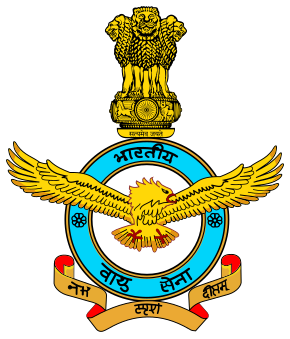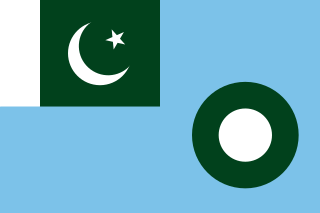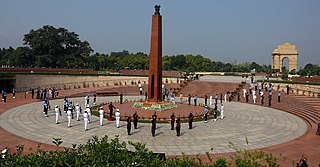
The International Institute for Strategic Studies (IISS) is a British research institute in the area of international affairs. Since 1997 its headquarters have been Arundel House in London, England.

The Indian Air Force (IAF) is the air arm of the Indian Armed Forces. Its complement of personnel and aircraft assets ranks fourth amongst the air forces of the world. Its primary mission is to secure Indian airspace and to conduct aerial warfare during armed conflict. It was officially established on 8 October 1932 as an auxiliary air force of the British Empire which honoured India's aviation service during World War II with the prefix Royal. After India gained independence from United Kingdom in 1947, the name Royal Indian Air Force was kept and served in the name of Dominion of India. With the government's transition to a Republic in 1950, the prefix Royal was removed.

The Agni-III is an Indian intermediate-range ballistic missile inducted into service in 2011 as the successor of the Agni-II. It has a range of 3,000 to 5,000 kilometres and can reach targets deep inside neighbouring countries including China.

The Indo-Pakistani War of 1965 was a culmination of skirmishes that took place between April 1965 and September 1965 between Pakistan and India. The conflict began following Pakistan's Operation Gibraltar, which was designed to infiltrate forces into Jammu and Kashmir to precipitate an insurgency against Indian rule. India retaliated by launching a full-scale military attack on West Pakistan. The seventeen-day war caused thousands of casualties on both sides and witnessed the largest engagement of armored vehicles and the largest tank battle since World War II. Hostilities between the two countries ended after a ceasefire was declared through UNSC Resolution 211 following a diplomatic intervention by the Soviet Union and the United States, and the subsequent issuance of the Tashkent Declaration. Much of the war was fought by the countries' land forces in Kashmir and along the border between India and Pakistan. This war saw the largest amassing of troops in Kashmir since the Partition of India in 1947, a number that was overshadowed only during the 2001–2002 military standoff between India and Pakistan. Most of the battles were fought by opposing infantry and armoured units, with substantial backing from air forces, and naval operations.
The National Security Council (NSC) of India is an executive government agency tasked with advising the Prime Minister's Office on matters of national security and strategic interest. It was established by the former prime minister of India Atal Bihari Vajpayee on 19 November 1998, with Brajesh Mishra as the first National Security Advisor. Prior to the formation of the NSC, these activities were overseen by the Principal Secretary to the preceding Prime Minister.

Agni-II, is the second strategic ballistic missile of Agni (missile) family envisaged to be the mainstay of the Indian missile-based strategic nuclear deterrence. The Agni-II is a medium-range ballistic missile (MRBM) with two solid fuel stages and a Post Boost Vehicle (PBV) integrated into the missile's Re-entry Vehicle (RV). The Agni's manoeuvring RV is made of a carbon-carbon composite material that is light and able to sustain high thermal stresses of re-entry, in a variety of trajectories. The Agni-IIA is a more advanced version of Agni-II, albeit with more sophisticated and lighter materials, yielding a better range and operating regime. Agni-IIA was later renamed as Agni-IV plugging the gap between Agni-II and Agni-III. While the first test of Agni-IV in December 2010 was a failure, the second test flight in November 2011 was a success Agni-II, developed as part of medium- and long-range Agni series of missile systems, has already been inducted into the Armed Forces.

The Indian Armed Forces are the military forces of the Republic of India. It consists of three professional uniformed services: the Indian Army, Indian Navy, and Indian Air Force. Additionally, the Indian Armed Forces are supported by the Indian Coast Guard and paramilitary organisations and various inter-service commands and institutions such as the Strategic Forces Command, the Andaman and Nicobar Command and the Integrated Defence Staff. The President of India is the Supreme Commander of the Indian Armed Forces. The Indian Armed Forces are under the management of the Ministry of Defence (MoD) of the Government of India. With strength of over 1.4 million active personnel, it is the world's second-largest military force and has the world's largest volunteer army. It also has the third-largest defence budget in the world. As per 2015 Credit Suisse report, the Indian Armed Forces is the world's fifth-most powerful military, whereas the 2020 GlobalFirepower report lists it as the fourth most-powerful military.
Major General Afsir Karim, was a retired Indian Army general and military scholar who has authored several books on strategic affairs & military studies. He is a graduate of the Defense Services Staff College, Wellington and the National Defence College.

The Chief of the Air Staff, is a military appointment and a statutory office held by an Air Chief Marshal in the Pakistan Air Force, who is appointed by the Prime Minister of Pakistan and final confirmation by the President of Pakistan. The CAS is the highest-ranking officer of the Pakistan Air Force and only pilots are appointed in this post.

The bilateral relations between the Republic of India and the Republic of South Africa have grown strong since the end of apartheid in South Africa in 1994. Both countries have since developed close strategic, cultural and economic ties. Both are former British colonies and full member states of the Commonwealth of Nations as Commonwealth republics.
The Western Air Command (WAC) is the regional command of Indian Air Force headquartered in New Delhi. It is the largest and most important Air Command of the IAF, comprising sixteen Air Force Bases (AFBs), and is responsible for aerial defence of North India.
Indian Army Corps of Signals is a corps and an arm of the Indian Army, which handles its military communications. It was formed on 15 February 1911 as a separate entity under Lieutenant Colonel S H Powell, and went on to make important contributions to World War I and World War II. The corps celebrated its 100-year anniversary of its raising on 15 February 2010.

Bharat Karnad is an emeritus professor in National Security Studies at the Centre for Policy Research, Delhi and a national security expert. He is the author of India's Nuclear Policy, Nuclear Weapons and Indian Security: The Realist Foundations of Strategy and author-editor of Future Imperilled: India's Security in the 1990s and Beyond.
Lords of Dharmaraja is the name of a hacker group, allegedly operating in India. This group came into the limelight for threatening to release the source code of Symantec's product Norton Antivirus, and for allegations on Government of India "arm-twisting" international mobile manufacturers to spy on United States-China Economic and Security Review Commission(USCC). Symantec has confirmed that the Symantec Endpoint Protection 11.0 and Symantec Antivirus 10.2 version source code has been compromised and obtained by the group, while United States authorities are still investigating allegations suspecting India's hand in spying.

The National War Memorial is an Indian national monument built to honour and remember soldiers of the Indian military who died in armed conflicts of Independent India. The names of armed forces personnel killed during the armed conflicts with Pakistan and China as well as the 1961 War in Goa, Operation Pawan, and other operations such as Operation Rakshak are inscribed on the memorial walls in golden letters.

Amar Jawan Jyoti is an Indian memorial constructed after the Indo-Pakistani War of 1971 to commemorate the martyred and unknown soldiers of the Indian Armed Forces who died during the war. Amar Jawan Jyoti consists of a marble pedestal on which a cenotaph is situated. "Amar Jawan" is scripted in gold on all four sides of the cenotaph and on top, a L1A1 Self-Loading Rifle stands on its barrel with a helmet of the Unknown Soldier on top. The pedestal is bound by four urns, one of which holds a continuously burning flame.
Gurugram Air Force Station, of the Indian Air Force's Western Air Command, is located at sector-33 of Gurugram city in Haryana state of India. It is located 28 km south of New Delhi.
Pushpinder Singh Chopra (1943–2021) was an Indian military historian and the author of several books, chiefly on military aviation history of India. He wrote extensively about the history of the Indian Air Force, from its inception in 1933 till present day. He was the founder editor of Vayu Aerospace and Defence Review, a bi-monthly aviation and defence magazine based in New Delhi, and the Society of Aerospace Studies. Singh was educated at The Doon School.












